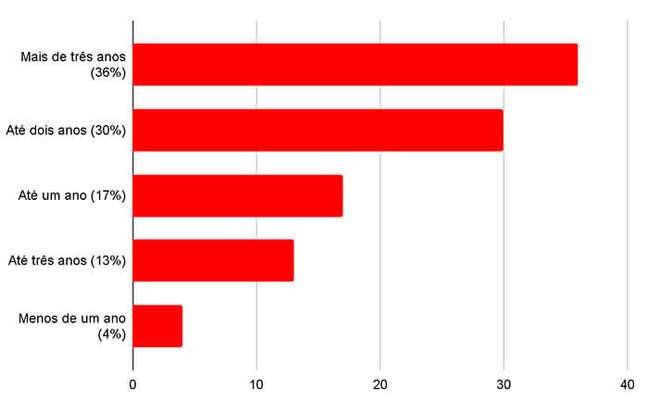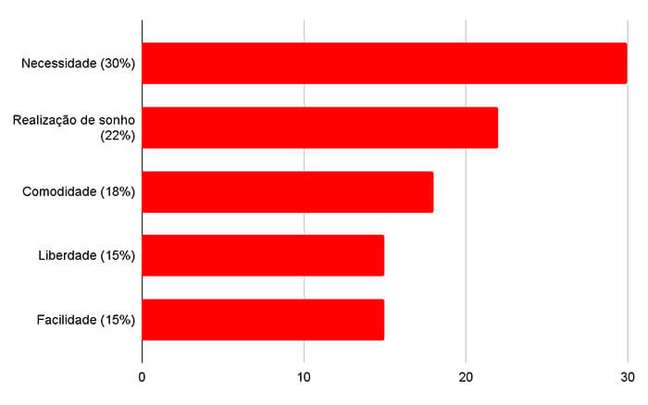The study presents the behavior of the Brazilian consumer in the first purchase, exchange, financing and motivation

Webmotors, automotive ecosystem and business and solutions portal for the segment, has published an unprecedented survey identifying trends and consumption habits in the new and pre-owned vehicle market in Brazil. The survey maps the consumer journey and the impacts of social class and gender among auto buyers in recent years.
When asked “was this your first car purchased?”, 61% of respondents answered “yes”, while 39% answered “no”. Among people earning between four and ten minimum wages, the percentage rates change to 85% (yes) and 15% (no), respectively.
For consumers with incomes between ten and 20 minimum wages, the variation is between 60% (yes) and 40% (no), and among those with incomes above 20 minimum wages, the sum reaches 45% ( yes) and 55% (No).
“The survey results show income as a differential for consumers to enter the auto market, signaling the importance of financing and syndicate,” said Cris Rother, CMO of Webmotors.
Estimated time to change the vehicle

As regards the expected time for changing cars, just over a third of those interviewed intend to change “in more than three years” (36%). On the other hand, 30% of those interviewed prefer to do it “within two years” and 17% “within one year”.
As for the consumer’s pockets, 50% of those earning between four and ten minimums declare their intention to replace the purchased vehicle “up to two years” – the highest exchange rate in the shortest period, compared to that found among the other social strata.
For consumers with incomes above 20 minimum wages, the expected change is also higher in the “up to two years” period, but only for 38% of respondents. For those earning between ten and twenty minimum wages, the highest expected exchange concentration is “in more than three years” (55%).
Still with regard to the estimated time for changing the vehicle, there is a notable difference in behavior between men and women.
“According to the study, the female public who intend to change cars within a year is 10% higher than the male public. The total number of men who want to change their vehicle for up to three years is 10% higher than women,” compares Rother. “These numbers contradict the common sense that men are more frequent car users than women,” concludes Rother.
Reasons for buying the first vehicle

When asked about the reasons for buying their first car, the interviewees indicated above all “necessity” (30%), “realization of a dream” (22%) and “convenience” (18%).
In the breakdown by social strata, these numbers change considerably. Among people earning between four and ten minimum wages, “realizing a dream” is the top reason for 30% of respondents. For those earning between ten and 20 minimum wages, “need” appears as the main reason for buying (39%).
According to consumers with incomes above the minimum 20, there is a triple link between “necessity”, “realization of a dream” and “freedom” – the three options were cited, in equal measure, by 23% of respondents in this social stratum.
Also according to the “Consumer Journey”, the cash payment option on the first purchase is the most practiced among the interviewees (39%), followed by the choice of a consortium (19%) and financing with cash injection (17% ).
The power of the digital medium in the decision-making process
When it comes to finding information to make a buying decision, the Internet tops the options for consumers (71%), regardless of social class or gender. Relatives (53%) and friends (51%) are, respectively, the second and third most used options. “The strength of the digital medium tends to increase more and more, both in research, in the virtual test-drive and even in the payment transaction,” estimates Rother.
The “Buyer’s Journey” study, conducted by the company in collaboration with Midminers, interviewed 120 people over the age of 18, from June 26 to July 7, 2022.
The sample was 52% women and 48% men, most of them aged between 25 and 34 (49%) and with incomes between ten and 20 minimum wages (46%). Only respondents who had already stated in a previous study that they bought a vehicle a few years ago took part in the survey.
🇧🇷🇧🇷
The best content in your email for free. Choose your favorite Terra newsletter. Click here!
Source: Terra
Ben Stock is a lifestyle journalist and author at Gossipify. He writes about topics such as health, wellness, travel, food and home decor. He provides practical advice and inspiration to improve well-being, keeps readers up to date with latest lifestyle news and trends, known for his engaging writing style, in-depth analysis and unique perspectives.




-qhia6ba319wh.png)


